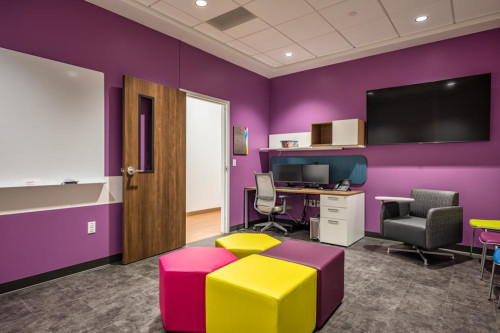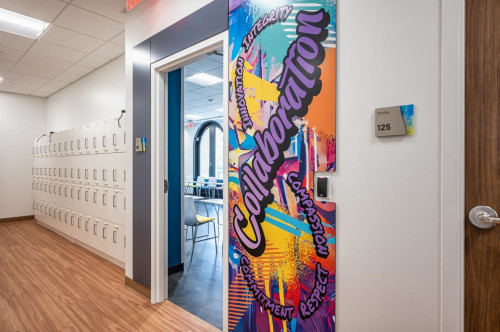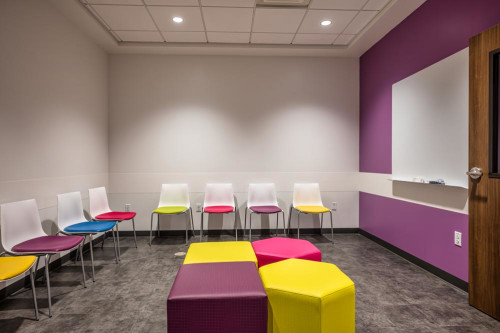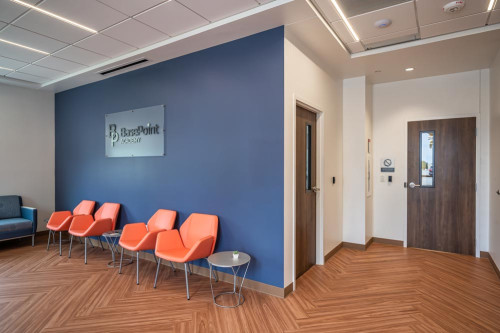






BasePoint Academy McKinney - Teen Mental Health & Counseling
Verified Center
This provider's information has been quality-checked by Recovery.com's Research Team for accuracy and completeness, including center verification through appropriate third-party organizations.
Treatment Focus
This center treats mental health conditions and co-occurring substance use. You receive collaborative, individualized treatment that addresses both issues for whole-person healing.
Primary Level of Care
Outpatient treatment offers flexible therapeutic and medical care without the need to stay overnight in a hospital or inpatient facility. Some centers offer intensive outpatient program (IOP), which falls between inpatient care and traditional outpatient service.
Treatment Focus
This center treats mental health conditions and co-occurring substance use. You receive collaborative, individualized treatment that addresses both issues for whole-person healing.
Primary Level of Care
Outpatient treatment offers flexible therapeutic and medical care without the need to stay overnight in a hospital or inpatient facility. Some centers offer intensive outpatient program (IOP), which falls between inpatient care and traditional outpatient service.
Provider's Policy
Contact the center to speak with a licensed therapist for a same day mental health assessment for teens and adolescents. BasePoint accepts insurance for Virtual Treatment and accepts most major private insurance companies. However, the center does not accept Medicaid, Medicare, or state insurance.
BasePoint Academy McKinney - Teen Mental Health & Counseling
BasePoint Academy McKinney - Teen Mental Health & Counseling
About BasePoint Academy McKinney - Teen Mental Health & Counseling
Contact the center to schedule a free mental health assessment for teens and adolescents.
When a teen is struggling, BasePoint Academy in McKinney understands. They're a lifeline for families navigating adolescent mental health challenges. Located conveniently off the highway, their facility is not a typical clinical space, but more a cozy home-like environment filled with compassionate professionals who can help. Whether a young person is battling anxiety, depression, ADHD, or substance challenges, BasePoint Academy offers a judgment-free perspective. Their flexible programs – from partial hospitalization to intensive outpatient – mean treatment adapts to the teen's life, not the other way around. Open seven days a week with transportation provided, they've thought of everything needed to make getting help as smooth as possible.
Build Resilience in the Face of Adversity
At BasePoint Academy, teen mental health care isn't about fixing something "broken" - it's about building resilience. Rather than shielding teens from adversity, they empower teens by equipping them with skills to minimize the impact of suffering. Using evidence-based therapies like cognitive behavioral therapy (CBT) and dialectical behavior therapy (DBT), they're teaching teens how to navigate life's challenges before those challenges become overwhelming. What makes BasePoint different is their belief that resilience is something that can be learned. By working closely with both teens and their families, they create a supportive ecosystem that doesn't just help teens survive their current struggles, but teaches them how to thrive in the future.
Transform Mental Health with Education, Culture, and Accessibility
Through a strategic partnership with the University of Texas Charter School, BasePoint Academy McKinney promotes academic continuity, allowing students to stay on track while receiving treatment. Their commitment to cultural competence creates an inclusive environment that respects diverse backgrounds and religious affiliations. The academy also offers crisis management services, providing immediate stabilization and evidence-based interventions for teens experiencing acute mental health challenges. Recognizing the need for flexibility, BasePoint Academy provides virtual treatment options that make mental health support accessible from anywhere, complemented by their in-person programs.
Find Comfort and Care in a Nurturing Environment
BasePoint Academy in McKinney, Texas, is designed specifically for teens ages 11 to 18. As clients enter the building, warm sunlight streams through large windows, and vibrant colors instantly lift moods, putting clients at ease. Thoughtfully designed therapy rooms invite real introspection, whether for individual or group sessions. Cozy common areas provide a comfortable space for reflection and connection.

Highlights from the Center
Highlights
These highlights are provided by and paid for by the center.
1-on-1 Counseling
Trauma-Informed Care
Adolescents
Spanish and English
Center Overview
Treatment Focus
This center treats mental health conditions and co-occurring substance use. You receive collaborative, individualized treatment that addresses both issues for whole-person healing.
Joint Commission Accredited
The Joint Commission accreditation is a voluntary, objective process that evaluates and accredits healthcare organizations (like treatment centers) based on performance standards designed to improve quality and safety for patients. To be accredited means the treatment center has been found to meet the Commission's standards for quality and safety in patient care.

Insurance Accepted
Cash Pay Rates
Estimated Cash Pay Rate
Center pricing can vary based on program and length of stay. Contact the center for more information. Recovery.com strives for price transparency so you can make an informed decision.




Levels of Care







Your Care Options
Specializations
Co-Occurring Disorders
A person with multiple mental health diagnoses, such as addiction and depression, has co-occurring disorders also called dual diagnosis.
Outpatient
During outpatient rehab, patients attend a structured treatment program while continuing to live at home.
Who We Treat
Adolescents
Teens receive the treatment they need for mental health disorders and addiction, with the added support of educational and vocational services.
Children
Treatment for children incorporates the psychiatric care they need and education, often led by on-site teachers to keep children on track with school.
LGBTQ+
Addiction and mental illnesses in the LGBTQ+ community must be treated with an affirming, safe, and relevant approach, which many centers provide.
Approaches
Evidence-Based
A combination of scientifically rooted therapies and treatments make up evidence-based care, defined by their measured and proven results.
Experiential
Expressive tools and therapies help patients process past situations, learn more about themselves, and find healing through action.
Holistic
A non-medicinal, wellness-focused approach that aims to align the mind, body, and spirit for deep and lasting healing.
Individual Treatment
Individual care meets the needs of each patient, using personalized treatment to provide them the most relevant care and greatest chance of success.
Therapies
1-on-1 Counseling
Patient and therapist meet 1-on-1 to work through difficult emotions and behavioral challenges in a personal, private setting.
Play Therapy
This approach is commonly used with children. It incorporates elements of play and self-expression, like boardgames, finger painting, dolls, and blocks.
Online Therapy
Patients can connect with a therapist via videochat, messaging, email, or phone. Remote therapy makes treatment more accessible.
Experiential Therapy
With this approach, patients heal by doing. Therapists help patients process difficult emotions to speak, using guided activities like art or dance.
Family Therapy
Family therapy addresses group dynamics within a family system, with a focus on improving communication and interrupting unhealthy relationship patterns.
Mindfulness-Based Cognitive Therapy
MBCT combines mindfulness practices—like meditation—with cognitive therapy techniques to help patients work through negative thought patterns.
Motivational Interviewing and Enhancement Therapy (MET)
This approach is based on idea that motivation to change comes from within. Providers use a conversational framework that may help you commit to recovery.
Conditions We Treat
Schizophrenia
Schizophrenia is a serious mental health condition that causes hallucinations, delusions, and disordered thinking.
Grief and Loss
Grief is a natural reaction to loss, but severe grief can interfere with your ability to function. You can get treatment for this condition.
ADHD, ADD
ADHD is a common mental health condition caused by dopamine imbalance. Common symptoms include inattention, hyperactivitiy, and impulsivity.
Anger
Although anger itself isn't a disorder, it can get out of hand. If this feeling interferes with your relationships and daily functioning, treatment can help.
Anxiety
Anxiety is a common mental health condition that can include excessive worry, panic attacks, physical tension, and increased blood pressure.
Bipolar
This mental health condition is characterized by extreme mood swings between depression, mania, and remission.
Burnout
Burnout entails mental and physical exhaustion, and leads to a severe lack of fulfillment. This condition is often caused by overwork.
Depression
Symptoms of depression may include fatigue, a sense of numbness, and loss of interest in activities. This condition can range from mild to severe.
Eating Disorders
An eating disorder is a long-term pattern of unhealthy behavior relating to food. Most people with eating disorders have a distorted self-image.
Substances We Treat
Alcohol
Using alcohol as a coping mechanism, or drinking excessively throughout the week, signals an alcohol use disorder.
Co-Occurring Disorders
A person with multiple mental health diagnoses, such as addiction and depression, has co-occurring disorders also called dual diagnosis.
Drug Addiction
Drug addiction is the excessive and repetitive use of substances, despite harmful consequences to a person's life, health, and relationships.
Languages
Care Designed for Your Needs
Special Considerations
Off-Site Amenities
Smoking and Vaping Policy






